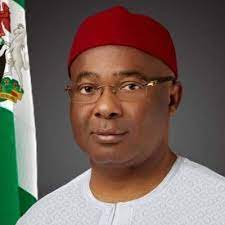Imo governor stresses importance of national census to economic planning
September 30, 2022348 views0 comments
By Saby Elemba, Owerri
…urges citizens to present themselves for counting
Imo State Governor Hope Uzodimma has advised citizens of the state not to see census exercise as “a mere collection of data and the number of human beings and sometimes houses”, saying that “national census includes the collection of demographic, social and economic data which the government uses to formulate economic policies”.
 Uzodimma, while flagging off a stakeholders’ summit on the 2023 Population and Housing Census in Owerri on Wednesday, appealed to all citizens of the state to make themselves available to be counted during the April 2023 national headcount by the National Population Commission.
Uzodimma, while flagging off a stakeholders’ summit on the 2023 Population and Housing Census in Owerri on Wednesday, appealed to all citizens of the state to make themselves available to be counted during the April 2023 national headcount by the National Population Commission.
He equally appealed to the National Population Commission to ensure that the technology to be deployed for the exercise is accurate and reliable.
The governor said he was pleased with the NPC and considered the summit “germane to the realization of our future plans as a government and as a people”.
“The data generated serve as a useful guide in the distribution of social amenities and infrastructural projects. In other words, population census is at the heart of the planning for the future by the government based on the figure obtained during the census exercise,” Uzodimma said.
“A properly conducted population census, therefore, saves the government from planning blindly,” he said.
The governor emphasised the importance of national census in planning for the health, demography, social welfare, infrastructure and general sustainability of the society, saying it serves as a roadmap towards the orderly planning and implementation of government policies and programmes.
He informed that statistics obtained from population census helps to formulate sartorial policies for good governance and expressed delight that the current administration of President Muhammadu Buhari has resolved to hold the National Population Census in April next year, notwithstanding the capital outlay and human resources involved.
He then urged the people to be more prepared for the exercise, appealing to them to be proactive and ready to participate actively in the exercise.
He regretted that “in the previous exercises our people were either nonchalant or indifferent and therefore refused to participate in the exercise based on ignorance”.
“For us to come out from complaints of marginalization, low revenue income, and social amenities, we must participate effectively in the upcoming population census,” he said.
The governor reminded the citizens that the outcome of any census is bound to impact on them positively or negatively because “the federal government uses the figures derived from census for revenue allocation, and allocation of social infrastructure needed for the welfare of the people”.
“When we fail to participate fully in a census exercise, the consequence is that we are undercounted. And when we are undercounted, we are short-changed in the distribution of national resources. It is therefore our civic responsibility as stakeholders to carry the message down to our people in the rural areas and encourage them to participate fully in the national population census exercise,” he said.
Uzodimma said a reliable census figure will guide the government in policy making and economic planning.
“When we know the exact number of youths in the state and what percentage of them are unemployed, it will help the government in designing more effective youth empowerment programmes,” he said.
“Unlike the voter registration exercise which has an age limit of 18 years and above, the population census is for everyone including a day-old baby. What this means is that nobody should be excluded as it is neither political nor sectional,” he said.
He assured the National Population Commission in the state that his government would give them every support they need to ensure that the exercise turns out to be a huge success.
He also directed the sole administrators of the LGAs, town union presidents, traditional rulers and all leaders in the state to take up the challenge of sensitizing the people on the need to participate in the all-important exercise.
